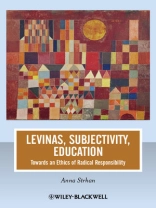Levinas, Subjectivity, Education explores how the
philosophical writings of Emmanuel Levinas lead us to reassess
education and reveals the possibilities of a radical new
understanding of ethical and political responsibility.
* Presents an original theoretical interpretation of Emmanuel
Levinas that outlines the political significance of his work for
contemporary debates on education
* Offers a clear analysis of Levinas’s central
philosophical concepts, including the place of religion in his
work, demonstrating their relevance for educational theorists
* Examines Alain Badiou’s critique of Levinas’s
work
* Considers the practical implications of Levinas’ theories
for concrete educational practices and frameworks
Inhoudsopgave
Preface vi
Acknowledgements viii
List of Abbreviations x
Introduction 1
PART I Levinas’s Teaching 17
1 Teaching, Subjectivity and Language in Totality and Infinity 19
2 The Infinite Responsibility of the Ethical Subject in Otherwise than Being 44
PART II Towards an Education Otherwise 71
3 Heteronomy, Autonomy and the Aims of Education 73
4 Grace, Truth and Economies of Education 95
PART III ‘Concrete Problems with Spiritual Repercussions’ 119
5 Towards a Religious Education Otherwise 121
6 Dialogue, Proximity and the Possibility of Community 141
7 Political Disappointment, Hope and the Anarchic Ethical Subject 175
Coda 199
Bibliography 204
Index 212
Over de auteur
Anna Strhan is Lecturer in Religious Studies at the
University of Kent, where she is researching the formation of
religious subjectivities in contemporary British society. With a
background in philosophy of education, cultural sociology, and
religious studies, Strhan’s work explores relationships
between knowledge, meaning, embodiment and ethics in modern
societies.












